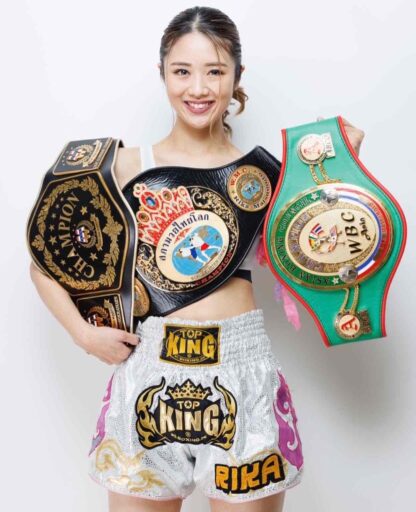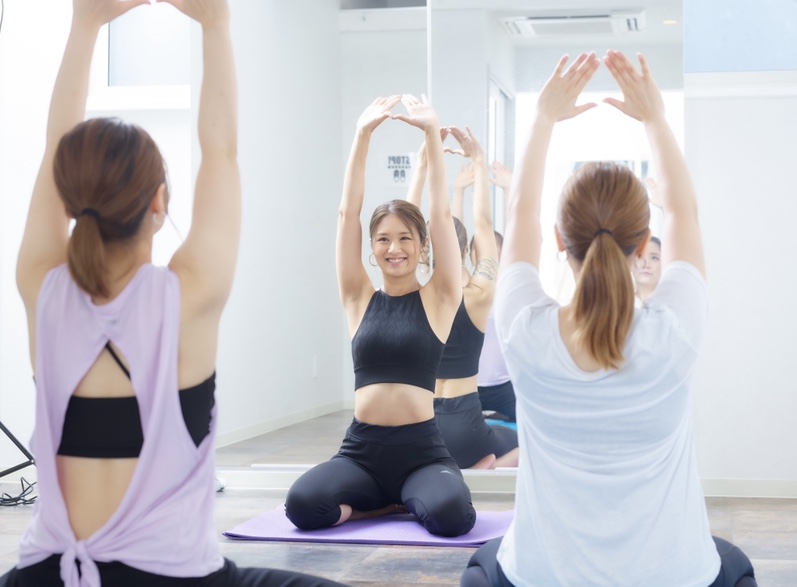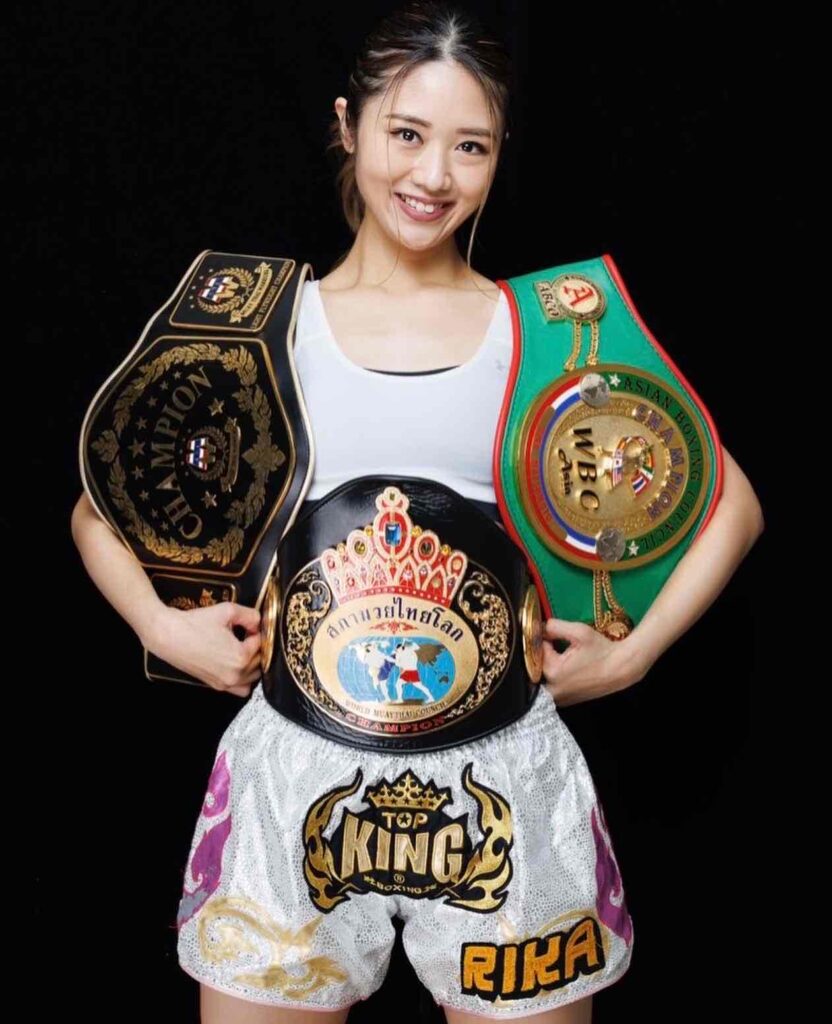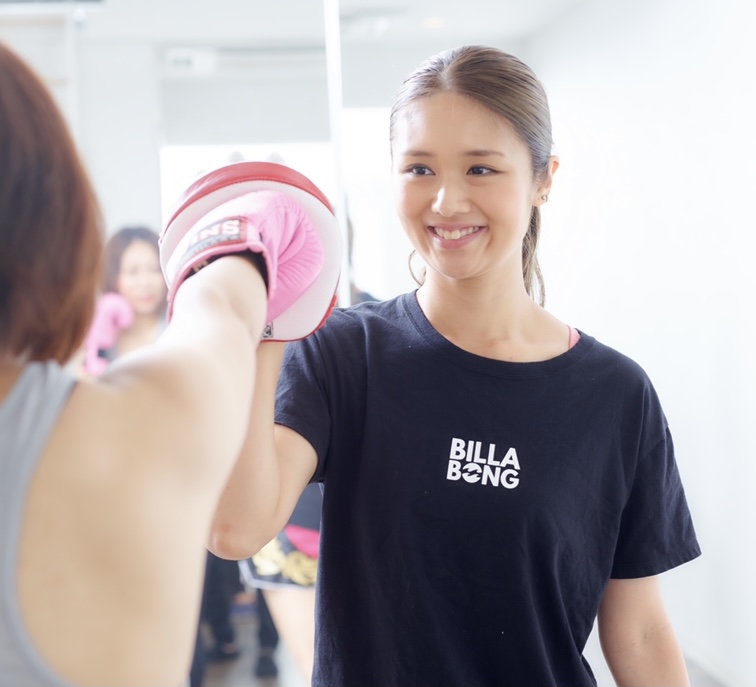RIKA, who has a Thai father and a Japanese mother, is a former world champion in the Thai martial art of Muay Thai. She is currently attracting attention for her incorporation of the ‘Wai Khru’ rituals practiced in Muay Thai. What does Muay Thai mean to RIKA?
Transformation of my shy self through Muay Thai
-Muay Thai is the national sport of Thailand?
Yes, it is. The origin of Muay Thai is something of a legend, but it is said that in ancient times, when there were no weapons, it was a means of fighting using one’s hands, feet, elbows and other parts of one’s body as weapons.
In the process of Muay Thai’s development as a sport, rules were made and it was narrowed down to a total of eight techniques. In Thailand, it is also taught in physical education classes.

-Your father is also a former Muay Thai fighter.
Yes, he is. My father was a Muay Thai fighter in Thailand and opened a Muay Thai gym in Japan. For that reason, people around me often say that I received a gifted education from my father, but surprisingly that is not the case. When I was a child, I wasn’t really interested in Muay Thai. I wasn’t the type to talk in front of people, I was shy and I couldn’t exercise at all. I wasn’t really interested in physical exercise either.
-That’s surprising. When did you start?
I started when I was around 16, which is a bit late. My father opened a Muay Thai gym in Tokyo, and the students at the gym were having fun like ilttle boys and girls. I remember thinking that it must be really fun if adults are so into it like that. It was an experience that really made me think from the bottom of my heart that it must be nice to be a sports person.
I was also just around the age when I started Muay Thai because I wanted to be a bit prettier and slimmer, and although I was shy, I wanted to change too. I think my father was happy that I started Muay Thai.

– Your family came to Japan from Thailand when you were 12 years old. What was Muay Thai like for your family while you were living in Japan?
I think my father was in his mid-40s when we came to Japan from Thailand. In Thailand he was known as a Muay Thai fighter, but in Japan, a foreign country, he was unknown to anyone, and I think there was also a kind of culture gap.
I think Muay Thai was the best thing he could do in that situation. I think it is a great achievement that he became a Muay Thai trainer, opened a gym, had several champions and established ‘Muay Thai from Thailand’ in Japan, where Muay Thai was still not well known.
I really feel my father’s love for Muay Thai, and that is how he was able to support our family. As a result of his sincere devotion to Muay Thai, we have been able to live a life in Japan. I am really thankful to my father and Muay Thai.
The Thai spirit of respect for superiors that lives on in Muay Thai
-Muay Thai has a pre-fight dance ritual called Wai Khru, and your Wai Khru has a reputation for being beautiful.
Thank you very much. Wai Khru is a ceremony to express gratitude to one’s teachers and parents before a match. Thailand is a country where people have a strong sense of respect for their superiors, and Wai Khru is a way of expressing gratitude to the teachers who gave you the skills, and to your parents for giving birth and raising you. I think the most important meaning of Wai Khru is that it is a time to get in the right frame of mind in the Muay Thai ring.
Each gym has its own unique movements, but I also try to make them look beautiful by adding my own extra arrangements.

-You run a fitness gym that incorporates Wai Khru?
Yes, I do. Wai Khru’s movements are characterised by their unobtrusive rhythm, which I think is the main difference between Wai Khru and other fitness programmes. Rhythmic movement not only builds muscle strength, but also helps to stabilise the mind. I am really impressed by the wisdom of the ancients, who used to do Wai Khru before a fight to calm their minds. I personally think it is a suitable exercise to do before something important, not only in Muay Thai but also in everyday life.
-Do you tell your gym students about those implications and roles of Wai Khru?
I tell them a lot! After all, everyone can relate to that. Wai Khru is not only about thanking your teachers and parents, but also about thanking those close to you in your daily life, for example your children, your partner, your friends and colleagues. I’ve heard that gratitude has the effect of increasing happiness. I think that if you are grateful for something, you will feel happy yourself, and this will be contagious and make your surroundings richer.
-Wai Khru has a positive effect on both the mind and the body.
When we think of Muay Thai, we have an image of physical strength. Of course physical strength is important, but it is also connected to mental strength. Through Muay Thai and Wai Khru, I hope to make people’s lives a little easier and give people a little courage to be themselves. After all, the mind and body are connected.

Wai Khru Fitness is an opportunity to enjoy life
-What are your future prospects?
Wai Khru fitness is a new type of fitness, so it may take a little more time to reach more people, but I hope that people close to me will be happy with it first. If you want to change or enjoy life like I did when I started Muay Thai at the age of 16, I would like you to try Muay Thai and Wai Khru! I’m sure it will help you to broaden your perspective.
I also want to bring Muay Thai to people who have never heard of Muay Thai or have never thought about martial arts at all. I would like to continue to work on activities that will bring me closer to these people.

RIKA
She began practising Muay Thai in 2004 (aged 16) with her Thai father, a former Muay Thai fighter, as her mentor, passed her professional test in 2007 and made her professional debut as a full-fledged female Muay Thai fighter in 2010. Won numerous titles, including the first Muay Thai Warrior women’s light flyweight champion, Savan Vegas tournament champion, WMC world women’s light flyweight champion and WBC Asian women’s light flyweight champion. In 2015, she became the first Japanese MVP of the year, and retired from competition the same year. She has worked as a Muay Thai trainer and referee, and has developed and supervised [Wai Khru Fit] since 2020. Currently she has opened a gym in Ebisu, where she gives lessons, and also works as a referee/judge and organises events.
Personal Muay Thai Gym R-FIT:https://rikafit.net/staff/
Interview and text: Orie Murohashi
Photos: RIKA


